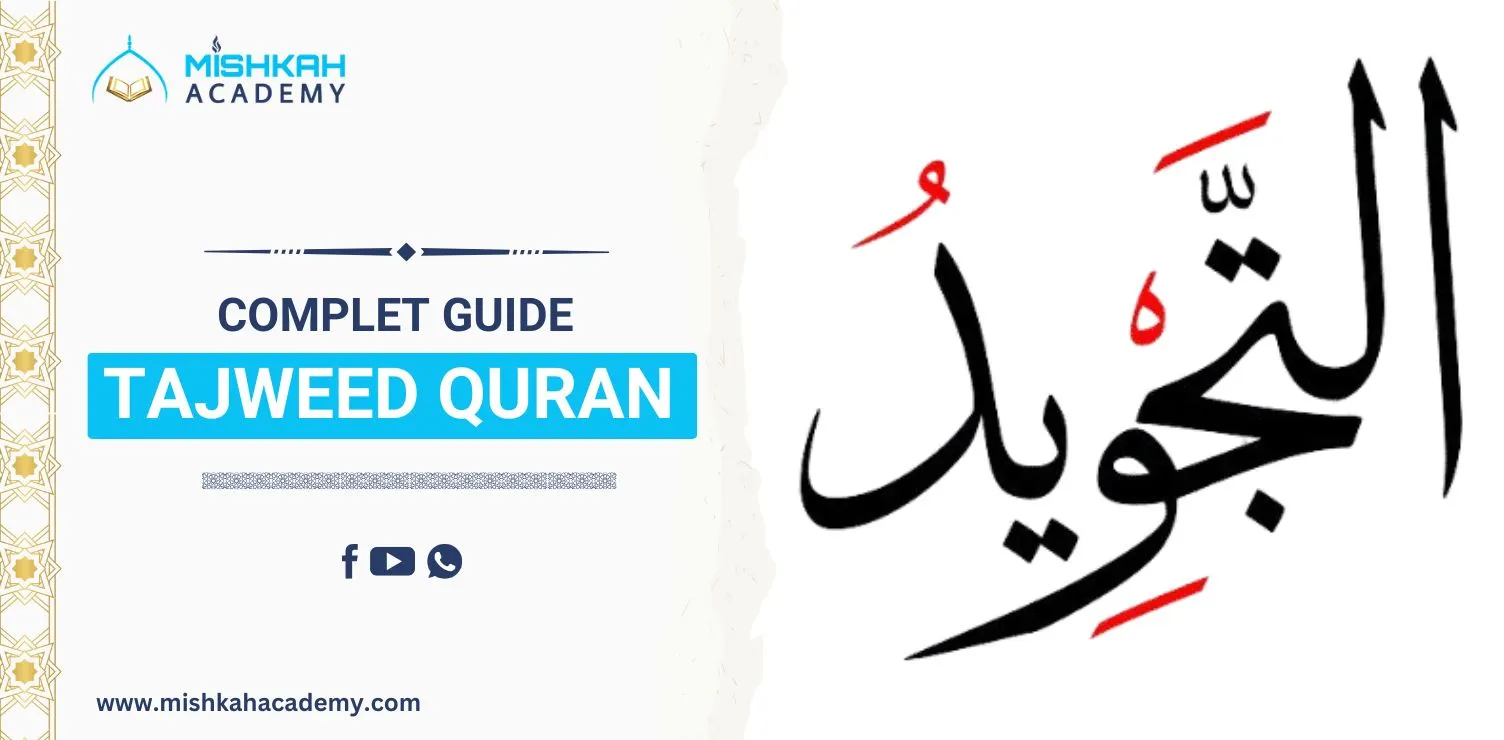Tajweed, or the proper recitation of the Quran, is very important in Islam. It’s not just about saying words right; it’s a deep connection with the divine word. It shows respect for the Quran’s sacredness.
The roots of Tajweed go back to the Prophet Muhammad (peace be upon him) and his followers. The Prophet taught and showed them how to recite the Quran correctly. This tradition has been passed down through scholars and reciters, who have made the rules of Tajweed clearer.
In this article, we’ll explore what Tajweed Quran means and why it’s significant. We’ll look at its history, the rules, and the benefits it brings. By learning about Tajweed, we can deepen our spiritual bond with the Quran and discover its deep wisdom.
What is the Tajweed Quran?
Table of Contents
ToggleThe Arabic word Tajweed (تَجْوِيد) which means “to improve” or “to make better,” is the source of the Arabic word Tajweed (تَجْوِيد). Tajweed is the term used to describe the guidelines that specify how each letter of the Quran should be pronounced when reciting it aloud. In order to make the recitation sound as similar to how it was revealed as feasible, it addresses pronunciation, pace, and the correct sequence of sounds.
Every letter and word in the Quran is subject to Tajweed guidelines, which help readers pronounce Arabic words correctly and avoid mispronouncing words that could alter their meaning. Accuracy is not the only goal; regard and respect for Allah’s teachings are equally important.
Why is Tajweed Important?
The significance of Tajweed is rooted in the respect and accuracy Muslims are required to show when reciting the Quran. Allah says in the Quran:
“And recite the Quran with measured recitation.” (Surah Al-Muzzammil, 73:4)
Tajweed recitation is a way to respect the words of God. The meaning of verses may be changed by improper pronunciation, which could cause the message to be misunderstood. Finally, reciting with Tajweed improves the worship experience since the sound of well-used words can evoke a stronger spiritual bond. Tajweed also keeps the Quran as near to the way Prophet Muhammad recited it as possible, maintaining its original language and phonetic beauty.
The Quran is more than just words; it’s a divine message that must be read carefully. This is why Tajweed Quran is so important. Tajweed is the art of reading the Quran correctly, with the right sound and rhythm.
Tajweed Of Quran
If you are a new student on the journey of learning the Quran, you must have heard the term “Tajweed” a lot. In fact, the rules of Tajweed play an important role in reciting the Qur’an and learning the Qur’an in general.
Prophet Muhammed (PBUH) said:
“The one who was devoted to the Qur’an will be told on the Day of Resurrection: ‘Recite and ascend (in ranks) as you used to recite when you were in the world. Your rank will be at the last Ayah you recite.”
Tajweed and the Sunnah of the Prophet
The Quran was recited by Prophet Muhammad (peace be upon him) with the highest case, clarity, and accuracy. He provided a timeless example for Muslims to follow by paying attention to the proper pronunciation, tone, and rhythm. His recitation shown Tajweed, showing how to approach the Quran with profound reverence in addition to exactly pronouncing each letter and word. Muslims are following the Sunnah of the Prophet, who was instructed by Angel Jibreel (Gabriel) and who told his followers the words of Allah exactly as they were revealed, by reciting the Quran with Tajweed.The Prophet said:
“The one who is proficient in the recitation of the Quran will be with the honorable and obedient scribes (angels).” (Sahih al-Bukhari)
This hadith highlights the great importance of recitation mastery, which Tajweed makes possible. It brings one closer to Allah and aligns one’s recitation with that of the Prophet. Thus, adhering to Tajweed is a way to preserve the divine word, emulate the Prophet, and receive blessings in this life as well as the next.
Start Your Tajweed Learning Journey Today
History of Tajweed
Tajweed has been practiced since the Prophet Muhammad was given the Quran by Angel Gabriel in an understandable manner. He then imparted that knowledge to his followers. The number of non-native Arabic speakers who converted to Islam increased as it went outside of the Arabian Peninsula. As a result, Tajweed regulations were written down to avoid recitation errors.When scholars started recording the guidelines and articulations to ensure the Quran was recited accurately in the eighth century, the science of Tajweed as we know it today was born. These regulations were compiled by eminent academics such as Al-Khalil ibn Ahmad and Al-Jazari, establishing an order that has been agreed to and honored ever since.
“Surely those who recite the Book of Allah, establish prayer, and donate from what We have provided for them—secretly and openly—˹can˺ hope for an exchange that will never fail, ” (Quran 35:29)
Key Rules of Tajweed
Tajweed consists of a number of rules that emphasize flow, pronunciation, and articulation. The following are some important Tajweed guidelines
- Noon Sakinah and Tanween
- Rules of Meem Sakinah
- Al Madd
- Qalqalah
- Noon and Meem Mushaddad
- Al-Isti’aathah (الاستعاذة) & Al-Basmalah (البسملة)
- Tarqeeq & Tafkheem (تَفْخِيم)
- Muldood (مُلْدُود)
- Waqf (وَقْف) and Ibtida’ (اِبْتِدَاء)
- Ghunnah (غُنَّة)
- Sifaat-al-Huroof (صفات الحروف)
- Makharij-al-Huroof (مخارج الحروف)
1. Makhaarij al-Huroof: Articulation Points
Every letter has a unique origin in the nasal path, throat, or mouth. Understanding each letter’s position of articulation is important to proper pronunciation.
2. Sifaat al-Huroof: Letter Characteristics
Each Arabic letter has characteristics, such as softness or weight, that specify how it should sound. Accurate pronunciation is made possible by an understanding of these qualities.
3. Merging Sounds (Idghaam)
Certain letters combine to form a single sound when placed close to one another. Idghaam comes in various types, including:
- Idghaam with Ghunnah: Involving a nasal sound.
- Idghaam without Ghunnah: Without nasalization.
4. Ikhfa: Secrecy
Ikhfa produces a softer, more organic sound by partially hiding some letters when they are followed by particular consonants.
5. Conversion in Iqlab
When accompanied by a specific letter, Iqlab smoothly transforms the nasal sounds of Tanween (نْ) or Noon Saakinah (نْ) into the “meem” sound.
6. The Echoing Sound, Qalqalah
Certain letters that are in a state of Sukoon (no vowel) are subject to the Qalqalah rule. It gives the recitation rhythm by producing an echo or bouncing sound.
7. Madd – Lengthening
Madd refers to the extension of vowel sounds for a specific duration. Different rules govern the length of extension, depending on the context.
Types of Tajweed Rules
There are two primary groups into which Tajweed rules fall:
1. Letter-Related Rules (Tajweed al-Huroof)
These guidelines focus on each letter’s unique articulation points and traits. For proper pronunciation, Makhaarij al-Huroof and Sifaat al-Huroof are necessary.
2. Tajweed al-Kalimah, or Word-Related Regulations
Idghaam, Ikhfa, Iqlab, and Madd are among the words whose letter relations are governed by these laws. They guarantee that the words have a natural rhythm and flow naturally.
Examples of Tajweed in Practice
Let’s look at some examples of Tajweed applications:
- Example 1: In Surah Al-Fatihah, verse 1, the word “الرحيم” requires a “Ghunnah” (nasal sound) when recited, which is one form of Idghaam with Ghunnah.
- Example 2: In Surah Al-Ikhlas, the Qalqalah rule applies to the word “أحد” (Ahad), where the letter “د” has a slight bounce at the end.
These examples highlight how applying Tajweed rules influences the pronunciation, ensuring an authentic recitation experience.
Common Mistakes in Tajweed
1. Lahn Jali (Error-Free)
These are blatant errors that modify the letter or pronunciation, which can change the word’s meaning. For instance, a typical mistake that might affect meaning is to confuse the letters Qaaf (ق) and Kaaf (ك).
2. Lahn Khafi (Hidden Mistakes)
These are more subtle errors, such as improper application of the Ikhfa or Idghaam rules. They may not alter the message, but they do remove from the recitation’s overall beauty and quality.
Start Your Tajweed Learning Journey Today
Benefits of learning Tajweed Quran
| Key Benefits of Mastering Tajweed | Description |
|---|---|
| Deeper connection with the Quran | Reciting the Quran with proper Tajweed Quran techniques fosters a more profound and meaningful connection with the divine word. |
| Enhanced spiritual focus and mindfulness | The discipline required to master Tajweed of Quran can lead to increased focus, concentration, and a heightened state of mindfulness during prayer and contemplation. |
| Personal growth and development | The skills acquired through Tajweed of Quran mastery, such as patience and attention to detail, can positively impact other areas of life. |
| Increased spiritual fulfillment | Perfecting Tajweed Quran skills can inspire a stronger commitment to the faith and a more enriched spiritual life. |
Learning Quran Tajweed: Step-by-Step Guide
Learning Tajweed Quran might seem hard at first, but it’s a rewarding path. Whether you’re new to Learn Tajweed Quran Online or want to improve, this guide will help you. It gives you the tools to get better at Tajweed.
- Understand the Basics: Begin by learning the key Rules of Tajweed. Know about Makharij (how letters are formed) and Sifaat (the qualities of letters). These are the basics for reciting the Quran right.
- Practice Regularly: To get good at learning the Tajweed Quran, practice every day. Spend time each day reciting the Quran with Tajweed. Focus on how you say the words and the rhythm.
- Seek Guidance from Experts: Look into taking a Tajweed Quran class with an Expert Quran Tutor. They can give you feedback and help you fix mistakes in your quran recitation.
Mishkah Academy: A Trusted Platform to Learn Tajweed
Mishkah Academy is a top name in Online Tajweed Quran Courses. It’s known for its outstanding advance Tajweed course. These programs are for all levels, from beginners to advanced learners.
Mishkah Academy’s courses help you understand Tajweed deeply. You’ll learn to recite the Quran with precision and beauty. With skilled teachers
Conclusion
Tajweed is a crucial component of Quranic recitation that guarantees accuracy, respect, and a closer relationship with the text. Muslims may recognize the beauty of the Quran as it was revealed while maintaining its original language and meaning by following the Tajweed principles. Learning Tajweed enhances one’s spiritual path and turns recitation into a potent form of worship, despite the time and dedication required.
For those who are just beginning their Tajweed adventure, keep in mind that the work is very beneficial. Look for a reliable teacher, put in a lot of practice by joining tajweed rules course, and remember that every step you take will get you one step closer to understanding and experiencing the Quran’s actual meaning.






